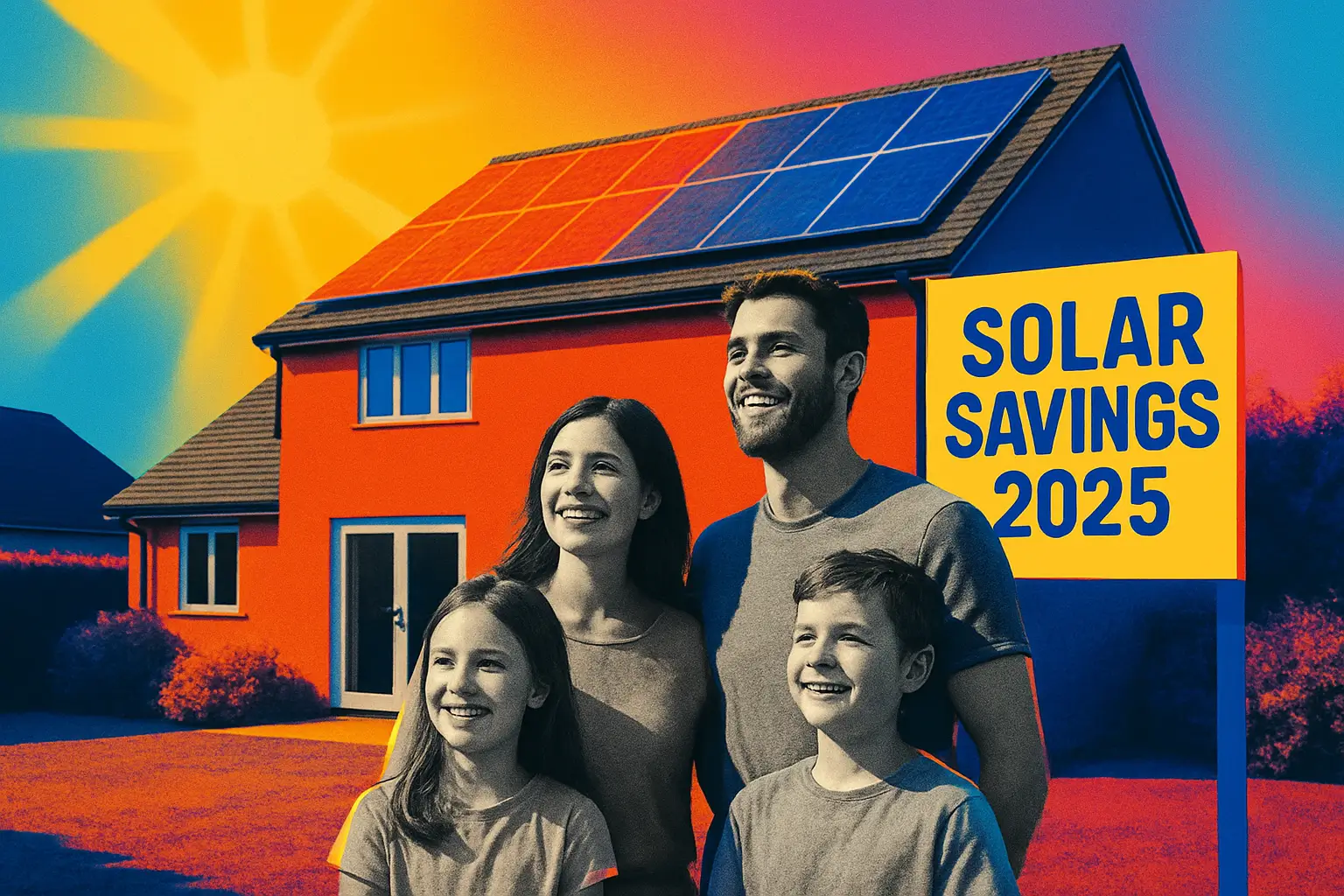Solar panels Home services discounts, perks & promo tips
Your expert guide to UK solar discounts, grants, and smart ways to reduce installation costs and boost long-term savings in 2025.
Solar savings in 2025 - what to know now
UK households can lower solar costs with tax breaks, grants, and group-buying deals. From 0% VAT to the Smart Export Guarantee, the landscape is stacked in your favour until at least March 2027. Act early to lock in savings and shorten payback times.
Who should read this
If you own a home in England, Scotland, or Wales and want lower energy bills, this guide is for you. Renters and social housing residents will also find options via the Warm Homes Plan and council-led schemes. Even if you installed years ago, you could still earn from exports by switching to a better tariff.
Jargon made simple
- 0% VAT: Government removes VAT on domestic solar panel materials and installation until March 2027 in GB - shaving roughly £1,000 off an average system. Solar batteries are usually excluded.
- ECO4: A government-backed programme funding energy upgrades for low-income households. In many cases, solar panels are fully funded.
- LA Flex: Local councils can widen ECO4 eligibility to modest-income households or those with health conditions affected by cold.
- Smart Export Guarantee (SEG): Energy suppliers pay you for exporting unused solar electricity to the grid. Tariffs vary, so comparison pays.
- Solar Together: Group-buying initiative run through local authorities that negotiates bulk pricing on installations.
- Payback period: Years it takes for bill savings and export income to cover your upfront costs.
- 4 kW system: A common domestic array size, typically suitable for an average three-bed home, depending on roof and usage.
Understanding APR is about real pounds and pence - with solar, the principle is the same: focus on the total cost, annual savings, and how long it takes to break even.
Your main routes to cheaper solar
Below is a quick comparison of the most useful UK options. Availability varies by region and provider.
| Scheme or route | Who it suits | Typical funding or benefit | Where available | Key timing |
|---|---|---|---|---|
| 0% VAT on solar panels | Most homeowners | ~£1,000+ off upfront cost | England, Scotland, Wales | Until March 2027 |
| ECO4 grant | Low-income or on qualifying benefits | Often fully funded installation | GB-wide via energy suppliers | Ongoing while scheme runs |
| LA Flex | Modest incomes or health-related needs | Extended eligibility - partial or full funding | Depends on local council | Varies by council |
| Smart Export Guarantee | Homes with solar installed | Up to ~£170 per year export income | GB via SEG suppliers | Ongoing - tariffs change |
| Solar Together | Homeowners wanting lower quotes | 30-40% below average costs | Selected councils | Windows open regionally |
| Warm Homes Plan | Renters and social housing | Grants for solar and efficiency | From April 2025, region dependent | Varies by area |
| Glow Green promo | Any UK homeowner | £550 off systems until 25 Nov 2025 | UK-wide | Ends 25 Nov 2025 |
What it could cost - and why it adds up
- Typical price: Around £6,500 for a 4 kW system in 2025 - installation included and around 16% lower than 2023.
- Savings: Average households can save roughly £500 per year on bills, plus up to £170 via SEG exports depending on tariff and usage.
- Payback: Many homes now see sub-10-year paybacks, faster if you shift usage to daytime or add a battery later.
- Risks: Export rates can change, roofs may need minor works, and very shaded roofs reduce output. Check warranties and workmanship guarantees.
Big picture: lower upfront costs plus steady annual savings make solar a financial decision, not just a green upgrade.
Who is eligible - the quick guide
- 0% VAT: Applies to residential solar panel materials and installation in England, Scotland, and Wales until March 2027. Batteries are generally excluded and some commercial installs do not qualify.
- ECO4: Eligibility based on income, benefits, and home efficiency. Many qualifying households receive panels at no cost. Start by contacting your energy supplier for an assessment.
- LA Flex: Councils can widen ECO4 to include households not on benefits but struggling with costs or with health conditions affected by cold. Not every council participates - check locally.
- Smart Export Guarantee: Available to homes with MCS-certified panels and a smart meter. Rates differ by supplier - British Gas, EDF, and Octopus are among SEG-licensed providers.
- Warm Homes Plan: From April 2025, targeted grants for renters, social housing residents, and lower-income households. Means-tested and region-specific.
- Solar Together: Availability opens in batches by region via local authorities - you register interest and receive a competitive group quote.
From idea to install - the simple pathway
- Check your roof - orientation, shade, available space.
- Confirm eligibility - 0% VAT, ECO4, LA Flex, or Warm Homes.
- Gather quotes - at least three MCS-certified installers.
- Compare SEG tariffs - assess unit rates and contract terms.
- Review payback - savings, export income, realistic usage shifts.
- Book survey - structural checks and final design confirmation.
- Schedule installation - aim for minimal disruption and daylight.
- Finalise paperwork - MCS certificate, DNO, warranty, and SEG.
Upsides and trade-offs to consider
Pros:
- Lower upfront cost via 0% VAT, grants, and promos.
- Ongoing bill savings and export income potential.
- Adds resilience against energy price volatility.
- Increases home efficiency credentials and appeal.
Cons:
- Upfront spend remains significant for some households.
- Export payments vary and can change over time.
- Shading, roof condition, or listed status may restrict options.
- Batteries add cost and are not VAT-free in most cases.
Read this before you sign anything
- Quote quality matters: insist on MCS certification, clear kit brands, output estimates, labour, scaffolding, and aftercare.
- Do the maths: model savings using your bill, daytime usage, and likely SEG rates - not just headline figures.
- Timing counts: 0% VAT ends March 2027, and promos like Glow Green’s £550 off end 25 November 2025.
- Check local participation: ECO4 via your supplier, LA Flex via your council, Solar Together via your authority’s website.
- Fine print: some free installs come with conditions or maintenance responsibilities - understand ownership and warranty terms.
If solar is not a fit today
- Efficiency first: loft insulation, draught-proofing, and efficient appliances can be cheaper per pound saved.
- Smaller arrays: start with a modest system and expand later.
- Wait for windows: watch for your council’s next Solar Together round.
- Battery later: add storage when prices dip or usage changes.
- Green tariffs: move to a renewables-backed tariff while you plan.
FAQs
-
Can I really get free solar panels in the UK? Some households can via ECO4, LA Flex, Warm Homes, or charity schemes, but eligibility checks apply and conditions may include maintenance or performance terms.
-
Do renters have any options? From April 2025, the Warm Homes Plan expands support for renters and social housing residents. Speak to your landlord and local authority about eligibility and timing.
-
How much could I earn from exports? Typical SEG income is up to around £170 per year, but it depends on your supplier’s tariff, time-of-use, and how much electricity you export.
-
Are batteries included in 0% VAT? Generally no. The current 0% VAT applies to solar panels and installation in GB, but batteries are usually excluded. Some bundled cases vary, so ask your installer.
-
What size system do I need? Many three-bed homes suit around 4 kW, but roof space, shading, and household usage patterns should guide the final design after a survey.
-
Will solar increase my home’s value? It can enhance appeal and reduce running costs, but value impacts vary by local market. Buyers increasingly value lower bills and energy efficiency.
Your next moves with Switcha
- Use Switcha to compare MCS-certified installers in your area.
- Check ECO4 and LA Flex eligibility with your supplier and council.
- Compare SEG tariffs from British Gas, EDF, Octopus, and others.
- Time your purchase to capture 0% VAT and the £550 Glow Green offer.
Quick win: gather three quotes this week and run a simple payback check against your actual bill.
Small print you should read
This guide provides general information for GB households and is not financial advice. Scheme rules, tariffs, eligibility criteria, and offers can change. Always confirm details with certified installers, your energy supplier, and your local authority before committing.
Get smarter with your money
Join thousands of people in the UK who are taking control of their financial future

FAQs
Common questions about managing your personal finances
Begin by tracking every expense for one month. Use an app or spreadsheet. No judgment. Just observe your spending patterns.
Cancel unused subscriptions. Cook at home. Compare utility providers. Small changes add up quickly.
Aim for 20% of your income. Start smaller if needed. Consistency matters more than the amount.
Choose reputable apps with strong security. Read reviews. Check privacy policies. Protect your financial data.
Pay bills on time. Keep credit card balances low. Check your credit report annually. Be patient.
Still have questions?
Our team is ready to help you navigate your financial journey
More financial insights
Explore our latest articles on personal finance and money management




